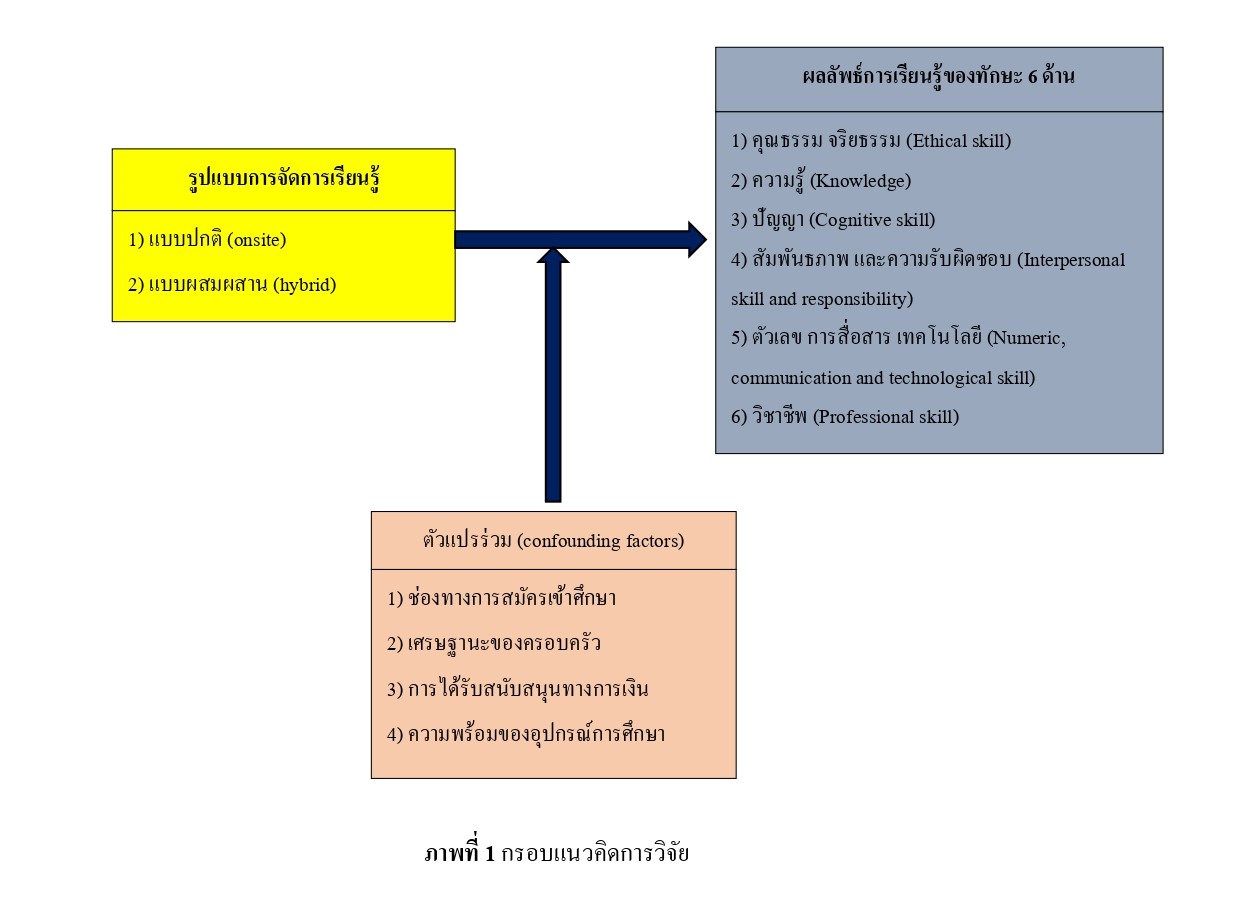Effects of Hybrid Learning Approach on Achievement of Program Learning Outcomes among Nursing Students of Bachelor Degree of Nursing Science
Keywords:
Hybrid learning, Nursing students, Expected learning outcomesAbstract
This study aims to explore the effects of hybrid learning approach on program learning outcomes among nursing students of Bachelor of Nursing Science Program. Retrospective study was applied. Secondary data gathering from a follow up study on nursing student’s competencies of the Faculty of Nursing, Prince of Songkla University, Pattani was analyzed. A total of 243 student identification numbers who graduated between the academic year 2016 to 2019 were recruited. Dependent variables were classified into 2 groups; 1) students who exposed the onsite learning and 2) students who exposed the hybrid learning. Independent variables were the program learning outcome scores which composed 6 domains, these were 1) ethical skill 2) knowledge 3) intellectual skill
4) interpersonal and responsible skill 5) numeric, communication and technological skill and 6) nursing skill. The Cronbach alpha test was done from the recruited samples to explore reliability of questionnaires. Each program learning outcome was analyzed and presented as median and quartile, logistic regression was used to identify the association of hybrid learning and each program learning outcome adjusted with confounding factors.
Results showed that the median score of each program learning outcomes was above 80 percent. There was no association between hybrid learning and knowledge, intellectual skill, interpersonal and responsible skill, numeric, communication and technological skill and nursing skill. However, hybrid learning was a risk factor of low achievement in the domain of ethical skill. Findings indicated that hybrid learning was less effective in enhancing ethical skill of nursing students compared to onsite learning, while there had not negatively affected to knowledge, intellectual skill, interpersonal and responsible skill, numeric, communication and technological skill and nursing skill.
References
Arnaert, A., Ahmad, H., Ponzoni, N., Oliver, C., & Grugel-Park, A. (2020). Blending learning: The preferred choice of clinical nurse educators to provide continuing professional development. Journal of Nursing Education and Practice, 10(1), 58 - 66. https://www.sciedupress.com/ journal/index.php/jnep/article/view/15761
Artiwitchayanon, A., Srisopa, P., & Wacharasin, C. (2022). Factors predicting nursing students’ learning outcomes through online learning during COVID-19 pandemic. Songklanagarind Journal of Nursing, 42(2), 85 - 97. https://he02.tci-thaijo.org/index.php/nur-psu/article/view/ 257580
Binhosen, W., & Vitoonmetha, N. (2021). Factors related to the levels of ethical development among nursing students with clinical experiences. APHEIT Journal of Nursing and Health, 3(3), 1-19. https://rsujournals.rsu.ac.th/index.php/ajnh/article/view/2686
Essadki, S., & Fourtassi, M. (2024). Effect of hybrid learning on students’ academic performance at the higher institute of nursing professions and health techniques of Oujda. International Journal of Engineering Pedagogy, 14(3), 140 - 149. https://online-journals.org/index. php/ ijep/article/view/48367
Farliana, N., Hardianto, H., & Oktarina, N. (2023). Hybrid learning trends in higher education post pandemic Covid 19: Scientometric mapping. World Journal of Advanced Research and Reviews ,17, 716 - 727. https://dx.doi.org/10.30574/wjarr
Gejendhiran, S., Arokia Anicia, S., Vignesh, S., & Kalaimani, M. (2020). Disruptive technologies: A promising key for sustainable future education. Procedia Computer Science, 172, 843 - 847. https://doi.org/10.1016/j.procs.2020.05.121
Hidayat, R., Moosavi, Z., Hermandra., Zulhafizh., & Hadisaputra, P. (2022). Achievement goals, well-being and lifelong learning: A mediational analysis. International Journal of Instruction, 15(1), 89 - 112. https://doi.org/10.29333/iji.2022.1516a
Kata, W., Chalakbang, W., Steannoppakao, P., & Pheasa, E. (2020). The development of nursing practice ethics indicators of nursing students. Journal of Humanities and Social Sciences Nakhon Phanom University, 10(3), 40 - 48. https://so03.tci-thaijo.org/index.php/npuj/article/ view/246718
Khaomala, J., & Somnukprasert, W. (2019). Effects of using integrated learning management with ethics on nursing behavior of nursing students. Journal of Health Research and Innovation, 2(1), 163 - 176. https://he02.tci-thaijo.org/index.php/jhri/article/view/243279
Khumyu, A., Chupan, S., Puttaruksa, L., Rattanajarana, S., Songaiad, D., & Chunchomgul, C. (2021). Factors related to professional nursing competency among nursing students at a university in the eastern region. Journal Faculty of Nursing Burapha University, 29(1), 1 - 12. https://he02 .tci-thaijo.org/index.php/Nubuu/article/view/250189
Lopez, E.N., Lopez, B., & Abadiano, M. (2023). Understanding generation z, -the new generation of learners: A technological-motivational-learning theory. Journal of Harbin Engineering University, 44(10), 770 - 784. https://harbinengineeringjournal.com/index.php/journal/article/ view/1688
Ministry of Education. (2017, July 20). Notification of Educational Standard: Bachelor Degree of Nursing Science. https://www.ubu.ac.th/web/files_up/46f2018011909463762.pdf
Ministry of Higher Education, Science, Research and Innovation. (2022, July 20). Notification of Ministry of Higher Education, Science, Research and Innovation: Bachelor of Science. https://www.ratchakitcha.soc.go.th/DATA/PDF/2565/A/020/T_0028.PDF
Panyoyai, P., & LeSeure, P. (2021). Effective instructional design during the COVID-19 pandemic: lesson learned from teaching the gerontological nursing practicum in community. APHEIT Journal of Nursing and Health, 3(3), 1 - 18. https://rsujournals.rsu.ac.th/index.php/ajnh /article/view/2681
Poboonnitikasem, P., & Sririthamanukul, W. (2021). The effectiveness of online learning among nursing students, School of Nursing, Rangsit University. Rangsit University.
Pomthong, K., Kanungpiarn, T., Pradubthong, O., & Sanpaung. S. (2023). The effect of blended learning program of principles and nursing techniques for promoting readiness on knowledge, principle, practice, skills and nursing techniques of student nurses. Journal of Nursing Siam University, 24(7), 20 - 30. https://he01.tci-thaijo.org/index.php/nursingsiamjournal/article/ view/264569
Saitoh, A., Yokono, T., Sakagami, M., Kashiwa, M., Abeywickrama, H.M., & Uchiyama, M. (2024). Perspectives of nursing students on hybrid simulation-based learning clinical experience: A text-mining analysis. Nursing Reports, 14(2), 988 – 999. https://doi.org/10.3390/nursrep140 20074
Sáiz-Manzanares, M.C., Escolar-Llamazares, M.C., & Arnaiz, G.Á. (2020). Effectiveness of blended learning in nursing education. International Journal of Environmental Research and Public Health, 17(5), 1589 - 1604. http://doi.org/10.3390/ijerph17051589
Tayyib, N., Alsolami, F., Asfour, H., Alshhmemri, M., Lindsay, G., Ramaiah, P., Alsulami, S., & Ali, H. (2021). Undergraduate nursing students endorse education standards in blended e-learning theory teaching during COVID-19 pandemic. The Open Nursing Journal, 15, 291 - 303. https://opennursingjournal.com/VOLUME/15/PAGE/291/
U-ma, A & Jehnok, M. (2023), A Study on the results of practical training for nursing techniques knowledge self-learning box Set. Journal of Organizational Innovation & Culture, 14(2), 155 - 165. https://so15.tci-thaijo.org/index.php/JOIC/article/view/378
Yılmaz, E., & Kaygin, H. (2018). The relation between lifelong learning tendency and achievement motivation. Journal of Education and Training Studies, 6(1), 1 - 7. http://doi.org/10.11114/ jets.v6i3a.3141

Downloads
Published
How to Cite
Issue
Section
License
Copyright (c) 2024 Princess of Naradhiwas University Journal

This work is licensed under a Creative Commons Attribution-NonCommercial-NoDerivatives 4.0 International License.



